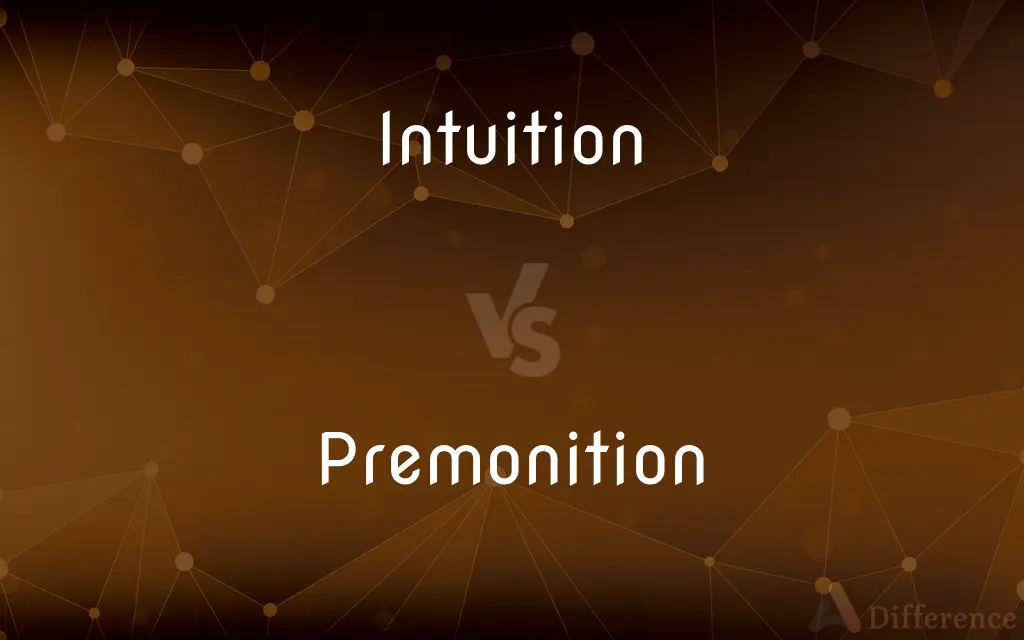Intuition vs. Premonition — What's the Difference?
By Maham Liaqat & Fiza Rafique — Updated on April 3, 2024
Intuition is a subconscious understanding or insight without rational reasoning, while premonition is a forewarning or anticipation of a future event, often without clear, logical basis.

Difference Between Intuition and Premonition
Table of Contents
ADVERTISEMENT
Key Differences
Intuition refers to an immediate grasp of truth, facts, or a way to act without the need for conscious reasoning, often based on accumulated experiences and internal cues. It's like an internal guidance system. On the other hand, premonition is specifically about foreseeing or feeling something that is going to happen, often without a logical explanation, and is typically related to events or outcomes.
Intuition plays a crucial role in decision-making, helping individuals to make choices quickly and efficiently based on subconscious understanding. This process is grounded in one's experiences, emotions, and knowledge. Whereas premonitions are more associated with a sense of foreboding or anticipation regarding future events, and they are not necessarily based on past experiences or logical deductions.
While intuition can be developed and honed over time through reflection and engagement with diverse situations, premonitions are often spontaneous and cannot be invoked at will. They are unexpected insights into future occurrences, perceived without any immediate, identifiable basis.
Intuition is valued in various professional and personal contexts for its ability to guide decision-making beyond analytical thinking. It reflects a deep-seated knowledge and understanding. Premonition, however, is often met with skepticism because it challenges rational explanations and operates beyond the commonly accepted understanding of time and causality.
Despite their differences, both intuition and premonition highlight the human capacity to perceive and react to information that is not immediately accessible through conventional sensory channels or logical reasoning. They suggest that human cognition and perception extend beyond the bounds of the five senses and rational thought processes.
ADVERTISEMENT
Comparison Chart
Definition
A subconscious understanding or insight without rational reasoning.
A forewarning or anticipation of a future event, often without a logical basis.
Basis
Accumulated experiences, emotions, knowledge.
Spontaneous feeling about future events without evident reason.
Application
Decision-making, problem-solving.
Forewarning about future events.
Development
Can be developed and honed through experience.
Spontaneous; cannot be intentionally developed.
Perception in Society
Generally accepted and valued for quick and efficient decision-making.
Often met with skepticism due to its inexplicable nature.
Compare with Definitions
Intuition
Non-analytical knowledge acquisition.
Intuition led him to the solution before he consciously worked through the problem.
Premonition
Intuitive anticipation of events.
She woke up with a premonition of receiving bad news.
Intuition
Insight derived from experiences.
His intuition about people's motives comes from years of observation.
Premonition
Forewarning of a specific future event.
She had a premonition that the trip would end in disaster.
Intuition
Subconscious guidance in decision-making.
She often relies on her intuition when making difficult career choices.
Premonition
Feeling something bad will happen.
His uneasy premonition turned out to be true when the storm hit.
Intuition
Inner sense of truth or falseness.
Despite the evidence, his intuition screamed that something was off.
Premonition
Unexplained feeling about the future.
He had a vague premonition that they would meet again.
Intuition
Immediate understanding without rationale.
Her intuition told her not to trust the seemingly friendly stranger.
Premonition
Spontaneous insight into the future.
The premonition of winning the lottery was so strong he bought a ticket.
Intuition
Intuition is the ability to acquire knowledge without recourse to conscious reasoning. Different fields use the word "intuition" in very different ways, including but not limited to: direct access to unconscious knowledge; unconscious cognition; inner sensing; inner insight to unconscious pattern-recognition; and the ability to understand something instinctively, without any need for conscious reasoning.The word intuition comes from the Latin verb intueri translated as "consider" or from the late middle English word intuit, "to contemplate".
Premonition
A presentiment of the future; a foreboding
I had a premonition that our risky endeavor would end badly.
Intuition
The ability to understand something instinctively, without the need for conscious reasoning
We shall allow our intuition to guide us
Premonition
A warning in advance; a forewarning
That skirmish was a premonition of battles to come.
Intuition
The faculty of knowing or understanding something without reasoning or proof.
Premonition
A clairvoyant or clairaudient experience, such as a dream, which resonates with some event in the future.
Intuition
An impression or insight gained by the use of this faculty
"I had this intuition you would come here just after the rain broke" (Carson McCullers).
Premonition
A strong intuition that something is about to happen (usually something negative, but not exclusively).
Intuition
Immediate cognition without the use of conscious rational processes.
Premonition
Previous warning, notice, or information; forewarning; as, a premonition of danger.
Intuition
A perceptive insight gained by the use of this faculty.
Premonition
A feeling of evil to come;
A steadily escalating sense of foreboding
The lawyer had a presentiment that the judge would dismiss the case
Intuition
A looking after; a regard to.
What, no reflection on a reward! He might have an intuition at it, as the encouragement, though not the cause, of his pains.
Premonition
An early warning about a future event
Intuition
Direct apprehension or cognition; immediate knowledge, as in perception or consciousness; - distinguished from "mediate" knowledge, as in reasoning; as, the mind knows by intuition that black is not white, that a circle is not a square, that three are more than two, etc.; quick or ready insight or apprehension.
Sagacity and a nameless something more, - let us call it intuition.
Intuition
Any object or truth discerned by intuition.
Intuition
Any quick insight, recognized immediately without a reasoning process; a belief arrived at unconsciously; - often it is based on extensive experience of a subject.
Intuition
The ability to have insight into a matter without conscious thought; as, his chemical intuition allowed him to predict compound conformations without any conscious calculation; a mother's intuition often tells her what is best for her child.
Intuition
Instinctive knowing (without the use of rational processes)
Intuition
An impression that something might be the case;
He had an intuition that something had gone wrong
Common Curiosities
Are intuition and premonition accepted in society?
Intuition is widely accepted and used in decision-making processes, while premonitions are often viewed with skepticism due to their inexplicable nature.
How do intuition and premonition differ in basis?
Intuition is based on subconscious integration of experiences, whereas premonitions have no clear basis and often relate to unforeseen events.
Can intuition and premonition be developed?
Intuition can be developed with experience and reflection; premonitions are spontaneous and cannot be intentionally developed.
How do intuition and premonition relate to decision-making?
Intuition directly aids decision-making by providing a subconscious understanding, whereas premonitions might influence decisions through forewarnings of future events.
What is a premonition?
A premonition is a strong feeling, often without a clear rationale, that something, especially something specific and significant, is going to happen.
Can premonitions be positive?
Yes, premonitions can be both positive or negative, although they are often associated with forewarnings of negative events.
How can intuition be enhanced?
Intuition can be enhanced by engaging with diverse experiences, practicing mindfulness, and reflecting on past decisions to improve subconscious processing.
Do intuition and premonition play a role in creativity?
Yes, both can play roles in creativity—intuition in connecting disparate ideas subconsciously and premonitions possibly inspiring creative works.
Is intuition always correct?
While intuition is based on subconscious knowledge, it is not infallible and can be influenced by biases or incomplete information.
What is intuition?
Intuition is a process of knowing or sensing without the use of rational processes; it's a quick and unconscious understanding or insight.
Do intuition and premonition operate in the same temporal frame?
No, intuition is about immediate understanding or decision-making, while premonition involves foresight into future events.
Can everyone have premonitions?
While not everyone reports having premonitions, they can potentially occur to anyone, regardless of their background or beliefs.
Are there professions where intuition or premonitions are more prevalent?
Intuition is highly valued in professions requiring quick decision-making, such as business and healthcare, while premonitions are more commonly reported in personal contexts.
Is there a scientific explanation for intuition and premonition?
Intuition is partially explained by the brain's ability to quickly process information subconsciously, while premonitions lack a widely accepted scientific explanation.
How do people experience premonitions?
Premonitions are typically experienced as spontaneous feelings or visions about the future, without a conscious understanding of their origin.
Share Your Discovery

Previous Comparison
Butterine vs. Butter
Next Comparison
Cuttlefish vs. SquidAuthor Spotlight
Written by
Maham LiaqatCo-written by
Fiza RafiqueFiza Rafique is a skilled content writer at AskDifference.com, where she meticulously refines and enhances written pieces. Drawing from her vast editorial expertise, Fiza ensures clarity, accuracy, and precision in every article. Passionate about language, she continually seeks to elevate the quality of content for readers worldwide.
















































